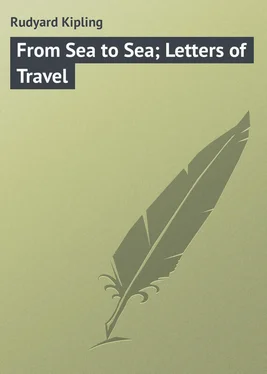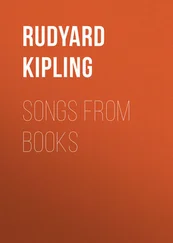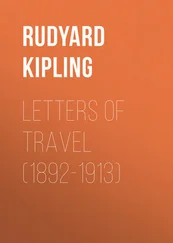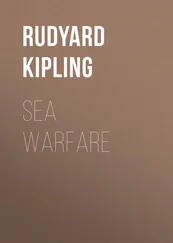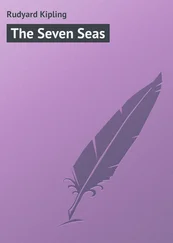Rudyard Kipling - From Sea to Sea; Letters of Travel
Здесь есть возможность читать онлайн «Rudyard Kipling - From Sea to Sea; Letters of Travel» — ознакомительный отрывок электронной книги совершенно бесплатно, а после прочтения отрывка купить полную версию. В некоторых случаях можно слушать аудио, скачать через торрент в формате fb2 и присутствует краткое содержание. Жанр: foreign_prose, foreign_language, на английском языке. Описание произведения, (предисловие) а так же отзывы посетителей доступны на портале библиотеки ЛибКат.
- Название:From Sea to Sea; Letters of Travel
- Автор:
- Жанр:
- Год:неизвестен
- ISBN:нет данных
- Рейтинг книги:5 / 5. Голосов: 1
-
Избранное:Добавить в избранное
- Отзывы:
-
Ваша оценка:
- 100
- 1
- 2
- 3
- 4
- 5
From Sea to Sea; Letters of Travel: краткое содержание, описание и аннотация
Предлагаем к чтению аннотацию, описание, краткое содержание или предисловие (зависит от того, что написал сам автор книги «From Sea to Sea; Letters of Travel»). Если вы не нашли необходимую информацию о книге — напишите в комментариях, мы постараемся отыскать её.
From Sea to Sea; Letters of Travel — читать онлайн ознакомительный отрывок
Ниже представлен текст книги, разбитый по страницам. Система сохранения места последней прочитанной страницы, позволяет с удобством читать онлайн бесплатно книгу «From Sea to Sea; Letters of Travel», без необходимости каждый раз заново искать на чём Вы остановились. Поставьте закладку, и сможете в любой момент перейти на страницу, на которой закончили чтение.
Интервал:
Закладка:
XV
TREATS OF THE STARTLING EFFECT OF A REDUCTION IN WAGES AND THE PLEASURES OF LOAFERDOM. PAINTS THE STATE OF THE BOONDI ROAD AND THE TREACHERY OF GANESH OF SITUR.
"A twenty-five per cent reduction all roun' an' no certain leave when you wants it. Of course the best men goes somewhere else. That's only natural, and 'ere's this sanguinary down mail a-stickin' in the eye of the Khundwa down! I tell you, Sir, Injia's a bad place – a very bad place. 'Tisn't what it was when I came out one and thirty year ago, an' the drivers was getting their seven and eight 'undred rupees a month an' was treated as men ."
The Englishman was on his way to Nasirabad, and a gentleman in the Railway was explaining to him the real reason of the decadence of the Empire. It was because, the Rajputana-Malwa Railway had cut all its employés twenty-five per cent. It is ungenerous to judge a caste by a few samples; but the Englishman had on the Road and elsewhere seen a good deal of gentlemen on the Railway, and they spend their pay in a manner that would do credit to an income of a thousand a month. Now they say that the twenty-five per cent reduction deprives them of all the pleasures of life. So much the better if it makes them moderately economical in their expenditure. Revolving these things in his mind, together with one or two stories of extravagances not quite fit for publication, the Englishman came to Nasirabad, before sunrise, and there to an evil-looking tonga. Quoth Ram Baksh, proprietor, driver, sais , and everything else, calmly: "At this time of the year and having regard to the heat of the sun who wants a top to a tonga? I have no top. I have a top, but it would take till twelve o'clock to put it on. And behold Sahib, Padre Martum Sahib went in this tonga to Deoli. All the officer Sahibs of Deoli and Nasirabad go in this tonga for shikar . This is a 'shutin-tonga'!" "When Church and Army are brought against one, argument is in vain." But to take a soft, office-bred unfortunate into the wilderness, upon a skeleton, a diagram of a conveyance, is brutality. Ram Baksh did not see it, and headed his two thirteen-hand rats straight towards the morning sun, along a beautiful military road. "We shall get to Deoli in six hours," said Ram Baksh the boastful, and, even as he spoke, the spring of the tonga bar snapt "mit a harp-like melodious twang." "What does it matter?" said Ram Baksh. "Has the Sahib never seen a tonga-iron break before? Padre Martum Sahib and all the Officer Sahibs in Deoli – " "Ram Baksh," said the Englishman, sternly, "I am not a Padre Sahib nor an Officer Sahib, and if you say anything more about Padre Martum Sahib or the officer in Deoli I shall grow very angry, Ram Baksh."
"Humph," said Ram Baksh, "I knew you were not a Padre Sahib." The little mishap was patched up with string, and the tonga went on merrily. It is Stevenson who says that the "invitation to the road," nature's great morning song, has not yet been properly understood or put to music. The first note of it is the sound of the dawn-wind through long grass. It is good, good beyond expression, to see the sun rise upon a strange land and to know that you have only to go forward and possess that land – that it will dower you before the day is ended with a hundred new impressions and, perhaps, one idea. It is good to snuff the wind when it comes in over large uplands or down from the tops of the blue Aravalis – dry and keen as a new-ground sword. Best of all is to light the First Pipe – is there any tobacco so good as that we burn in honour of the breaking day? – and, while the ponies wake the long white road with their hooves and the birds go abroad in companions together, to thank your stars that you are neither the Subaltern who has Orderly Room, the 'Stunt who has office, or the Judge who has the Court to attend; but are only a loafer in a flannel shirt bound, if God pleases, to "little Boondi," somewhere beyond the faint hills beyond the plain.
But there was alloy in this delight. Men had told the Englishman darkly that Boondi State had no love for Englishmen, that there was nowhere to stop, and that no one would do anything for money. Love was out of the question. Further, it was an acknowledged fact that there were no Englishmen of any kind in Boondi. But the Englishman trusted that Ganesh would be good to him, and that he would, somehow or other, fall upon his feet as he had fallen before. The road from Nasirabad to Deoli, being military in its nature, is nearly as straight as a ruler and about as smooth. Here and there little rocky hills, the last off-shoots of the Aravalis to the west, break the ground; but the bulk of it is fair and without pimples. The Deoli Force are apparently so utterly Irregular that they can do without a telegraph, have their mails carried by runners, and dispense with bridges over all the fifty-six miles that separate them from Nasirabad. However, a man who goes shikarring for any length of time in one of Ram Baksh's tongas would soon learn to dispense with anything and everything. " All the Sahibs use my tonga; I've got eight of them and twenty pairs of horses," said Ram Baksh. "They go as far as Gangra, where the tigers are, for they are 'shutin-tongas.'" Now the Englishman knew Gangra slightly, having seen it on the way to Udaipur; and it was as perverse and rocky a place as any man would desire to see. He politely expressed doubt. "I tell you my tongas go anywhere," said Ram Baksh, testily. A hay-wagon – they cut and stack their hay in these parts – blocked the road. Ram Baksh ran the tonga to one side, into a rut, fetched up on a tree-stump, rebounded on to a rock, and struck the road again. "Observe," said Ram Baksh; "but that is nothing. You wait till we get on the Boondi Road, and I'll make you shake, shake like a bottle." "Is it very bad?" "I've never been to Boondi myself, but I hear it is all rocks – great rocks as big as this tonga." But though he boasted himself and his horses nearly all the way, he could not reach Deoli in anything like the time he had set forth. "If I am not at Boondi by four," he had said, at six in the morning, "let me go without my fee." But by midday he was still far from Deoli, and Boondi lay twenty-eight miles beyond that station. "What can I do?" said he. "I've laid out lots of horses – any amount. But the fact is I've never been to Boondi. I shan't go there in the night." Ram Baksh's "lots of horses" were three pair between Nasirabad and Deoli – three pair of undersized ponies who did wonders. At one place, after he had quitted a cotton wagon, a drove of gipsies, and a man on horseback, with his carbine across his saddle-bow, the Englishman came to a stretch of road so utterly desolate that he said: "Now I am clear of everybody who ever knew me. This is the beginning of the waste into which the scape-goat was sent."
From a bush by the roadside sprang up a fat man who cried aloud in English: "How does Your Honour do? I met Your Honour in Simla this year. Are you quite well? Ya-as, I am here. Your Honour remembers me? I am travelling. Ya-as. Ha! Ha!" and he went on, leaving His Honour bemazed. It was a Babu – a Simla Babu, of that there could be no doubt; but who he was or what he was doing, thirty miles from anywhere, His Honour could not make out. The native moves about more than most folk, except railway people, imagine. The big banking firms of Upper India naturally keep in close touch with their great change-houses in Ajmir, despatching and receiving messengers regularly. So it comes to pass that the necessitous circumstances of Lieutenant McRannamack, of the Tyneside Tailtwisters, quartered on the Frontier, are thoroughly known and discussed, a thousand miles south of the cantonment where the light-hearted Lieutenant goes to his money-lender.
This is by the way. Let us return to the banks of the Banas River, where "poor Carey," as Tod calls him, came when he was sickening for his last illness. The Banas is one of those streams which runs "over golden sands with feet of silver," but, from the scarp of its banks, Deoli in the rains must be isolated. Ram Baksh, questioned hereon, vowed that all the Officer Sahibs never dreamed of halting, but went over in boats or on elephants. According to Ram Baksh the men of Deoli must be wonderful creatures. They do nothing but use his tongas. A break in some low hills gives on to the dead flat plain in which Deoli stands. "You must stop here for the night," said Ram Baksh. "I will not take my horses forward in the dark; God knows where the dak-bungalow is. I've forgotten, but any one of the Officer Sahibs in Deoli will tell you."
Читать дальшеИнтервал:
Закладка:
Похожие книги на «From Sea to Sea; Letters of Travel»
Представляем Вашему вниманию похожие книги на «From Sea to Sea; Letters of Travel» списком для выбора. Мы отобрали схожую по названию и смыслу литературу в надежде предоставить читателям больше вариантов отыскать новые, интересные, ещё непрочитанные произведения.
Обсуждение, отзывы о книге «From Sea to Sea; Letters of Travel» и просто собственные мнения читателей. Оставьте ваши комментарии, напишите, что Вы думаете о произведении, его смысле или главных героях. Укажите что конкретно понравилось, а что нет, и почему Вы так считаете.
